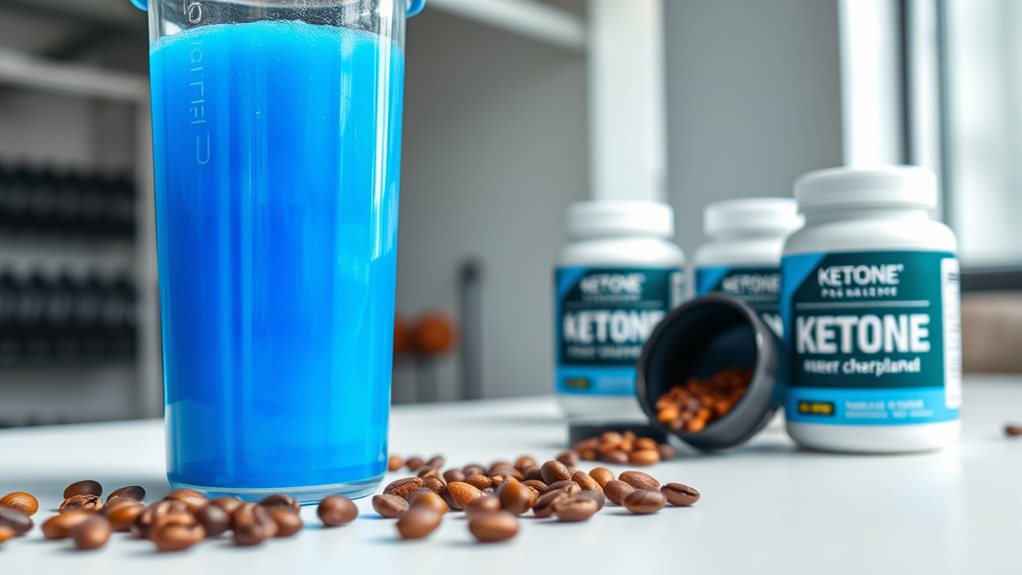Best Keto Pre-Workout Supplements for Energy & Endurance
When you're on keto, your energy needs change dramatically, yet many athletes grab standard pre-workouts loaded with sugars that kick you out of ketosis. You've worked too hard on your diet to let a poor supplement choice sabotage your results. Finding the right keto-friendly pre-workout can mean the difference between powering through intense sessions and hitting the wall mid-workout. The best options leverage MCT oils, BHB ketones, and natural stimulants to fuel your performance without compromising your metabolic state.
Understanding Why Standard Pre-Workouts Don't Work on Keto

While many fitness enthusiasts rely on traditional pre-workout supplements to boost their performance, these products often fail those following a ketogenic diet. The issue lies in their carbohydrate content and ingredient profile.
Standard pre-workouts typically contain high amounts of sugar, maltodextrin, or other carbs that can kick you out of ketosis. They're designed for athletes using glucose as their primary fuel source, not fat.
Additionally, these supplements often include ingredients that work effectively with carbohydrate metabolism, like certain creatine formulations and insulin-spiking compounds. Without adequate glycogen stores, you'll experience diminished effects and potential energy crashes.
Your body's altered metabolism on keto requires specific supplement formulations that support fat utilization and provide energy without disrupting your metabolic state.
Key Ingredients to Look for in Keto-Friendly Pre-Workouts
Five essential ingredients distinguish effective keto pre-workout supplements from their conventional counterparts.
Look for MCT oil, which provides rapid ketone production for immediate energy without spiking insulin.
BHB (beta-hydroxybutyrate) salts deliver exogenous ketones that boost blood ketone levels, enhancing both mental focus and physical performance.
Caffeine remains valuable on keto, increasing alertness and workout intensity while potentially accelerating fat oxidation.
Electrolytes—specifically sodium, potassium, and magnesium—are vital since ketosis increases mineral excretion, leading to potential deficiencies that hamper performance.
Finally, seek products containing branched-chain amino acids (BCAAs), which protect muscle tissue during high-intensity workouts when glycogen stores are limited.
These specialized ingredients work synergistically to fuel your workouts without disrupting ketosis or compromising your metabolic state.
Top 5 Keto Pre-Workout Supplements for 2023

After extensive testing and research, these five keto pre-workout supplements have emerged as market leaders for 2023.
Perfect Keto's Pre-Workout leads the pack with its clean MCT oil formula and natural caffeine from green tea.
UCAN Energy Powder offers sustained energy with its patented SuperStarch that won't spike insulin levels.
BPI Sports Keto Pre-Workout delivers BHB ketones alongside performance-enhancing amino acids for muscle preservation during intense sessions.
Kegenix PRIME stands out for its rapid ketone production and electrolyte blend specifically designed for fat-adapted athletes.
Rounding out the list, KetoLogic BHB provides a versatile option that works well both as a pre-workout and midday energy booster with minimal ingredients and maximum ketone support.
Each formula maintains ketosis while optimizing your training performance.
MCT Oil as a Pre-Workout Energy Source
Because ketogenic dieters can't rely on carbohydrates for quick energy, MCT oil has emerged as a powerful alternative fuel source before workouts.
Unlike standard fats, MCTs bypass normal digestion and convert rapidly into ketones, providing immediate energy for your training session.
You'll find MCT oil particularly effective when consumed 30-45 minutes before exercise. Start with one teaspoon and gradually increase to 1-2 tablespoons to avoid digestive discomfort.
Mix it into your coffee for a potent pre-workout combination that enhances both mental focus and physical performance.
The medium-chain triglycerides in MCT oil—particularly C8 (caprylic acid)—offer the most efficient conversion to ketones.
When selecting an MCT supplement, look for products containing higher percentages of C8 for maximum pre-workout benefits.
Caffeine and BHB Ketones: The Perfect Performance Combo

While MCT oil provides clean energy on a ketogenic diet, combining caffeine with exogenous beta-hydroxybutyrate (BHB) ketones creates an even more powerful pre-workout formula. This synergistic pairing boosts both mental focus and physical performance simultaneously.
| Benefit | How It Works |
|---|---|
| Enhanced Focus | Caffeine blocks adenosine receptors |
| Quick Energy | BHB provides immediate fuel source |
| Improved Endurance | Spares muscle glycogen during workouts |
| Reduced Fatigue | Caffeine extends time to exhaustion |
| Faster Recovery | BHB reduces exercise-induced inflammation |
You'll find this combination particularly effective for high-intensity training sessions when carb intake is restricted. For best results, consume 100-200mg caffeine with 10-12g of BHB salts approximately 30 minutes before exercise.
How Electrolytes Enhance Keto Exercise Performance
Beyond caffeine and BHB ketones, electrolytes play a fundamental role in keto workout performance. When you're following a ketogenic diet, your body excretes more sodium, potassium, and magnesium, making supplementation essential before exercise.
Sodium prevents muscle cramps and maintains proper fluid balance, while potassium regulates muscle contractions and nerve signals. Magnesium supports energy production and muscle recovery, particularly important during high-intensity training.
You'll notice immediate improvements in endurance and strength when properly supplemented before workouts. Look for pre-workout formulas containing at least 1000mg sodium, 300mg potassium, and 150mg magnesium to counteract keto-related electrolyte depletion.
Don't underestimate how electrolytes can transform your workout quality—they're not just for hydration but directly impact your muscles' ability to perform under ketogenic conditions.
Natural vs. Synthetic Keto Pre-Workout Options
When choosing keto pre-workout supplements, you'll encounter both natural and synthetic options, each with distinct advantages and considerations. Natural supplements typically contain whole food ingredients and plant extracts that your body recognizes and processes efficiently, often with fewer side effects.
| Supplement Type | Benefits | Considerations |
|---|---|---|
| Natural MCT Oil | Clean energy, minimal processing | Slower absorption rate |
| Beetroot Extract | Natural nitric oxide boost | Earthy taste, less potent |
| Matcha Green Tea | Sustained energy, antioxidants | Moderate caffeine content |
| Synthetic BHB Salts | Rapid ketone elevation | Potential digestive discomfort |
| Lab-Created Stimulants | Precise dosing, immediate effect | Higher risk of jitters, crashes |
Consider your personal preferences, sensitivity to ingredients, and fitness goals when deciding between natural purity or synthetic precision for your keto workouts.
Timing Your Keto Pre-Workout for Maximum Results
The precise timing of your keto pre-workout supplement can greatly impact your exercise performance and results. Most keto-friendly pre-workouts work best when consumed 20-30 minutes before training, allowing the ingredients to enter your bloodstream and activate when you need them most.
For those doing fasted workouts, timing becomes even more essential.
You'll want to:
- Take MCT oil or ketone esters 30-45 minutes pre-workout for quick energy without disrupting ketosis
- Consume electrolytes about 15-20 minutes before training to prevent keto-related cramping
- Time caffeine intake 30 minutes before exercise for ideal mental focus and fat-burning potential
Experiment with these timing windows to discover what works best for your body, as individual metabolism and workout intensity can influence ideal supplementation timing.
Common Side Effects and How to Avoid Them
Despite their performance benefits, keto pre-workout supplements can cause several side effects if not used properly. The most common issues include digestive distress, jitters, insomnia, and headaches.
To avoid digestive problems, start with half the recommended dose and gradually increase it. Taking your supplement with a small fat-based snack can also help buffer stomach discomfort.
If you're sensitive to stimulants, choose caffeine-free formulas or take your pre-workout at least 6 hours before bedtime to prevent sleep disruption.
Headaches often result from dehydration, so drink plenty of water and maintain proper electrolyte balance.
Some users experience a temporary keto "crash" from certain ingredients. Combat this by choosing supplements with sustained-release MCTs instead of simple carbs or sugars.
Creating Your Own Keto Pre-Workout Stack at Home
Building your own keto pre-workout stack at home offers both cost savings and complete control over ingredients.
You'll avoid unnecessary additives while tailoring formulations to your specific fitness goals and dietary requirements.
Start with these keto-friendly foundations:
MCT Oil - Add 1-2 tablespoons to coffee or tea for quick medium-chain triglycerides that convert rapidly to ketones, providing clean energy without insulin spikes.
Electrolyte Mix - Combine pink Himalayan salt, potassium citrate, and magnesium citrate to prevent cramping and support ideal muscle function.
Caffeine Source - Use black coffee, green tea, or caffeine pills (100-200mg) based on your stimulant tolerance for enhanced focus and performance.
Experiment with additional supplements like beta-alanine, creatine, or BCAAs based on your specific training needs and keto adaptation level.
Frequently Asked Questions
Can I Take Keto Pre-Workouts While Intermittent Fasting?
You can take keto pre-workouts while intermittent fasting, but timing matters.
Most keto pre-workouts contain minimal calories and won't break your fast if taken during your fasting window.
However, some products include MCT oil or BCAAs that might technically end your fast.
If you're strict about fasting benefits, choose zero-calorie options or schedule your workout and supplement closer to your eating window.
How Long Does It Take to Adapt to Keto Pre-Workouts?
Adapting to keto pre-workouts typically takes 1-2 weeks as your body adjusts to the ketone-based energy source.
You'll likely notice initial fatigue or decreased performance during this adjustment period. Stick with it consistently, and you'll gradually experience improved energy levels and workout endurance.
Everyone's adaptation timeline varies based on metabolic health, previous diet, and exercise intensity.
Start with smaller doses and gradually increase to minimize potential digestive discomfort during the adjustment phase.
Are Keto Pre-Workouts Safe During Pregnancy?
You should consult your healthcare provider before using any pre-workout supplements during pregnancy, including keto formulations.
Pregnancy alters your body's nutritional needs and metabolism, and many supplements contain ingredients like caffeine or stimulants that mightn't be safe for your developing baby.
The ketosis state itself requires medical supervision during pregnancy.
Don't experiment with supplements during this critical time without professional medical guidance tailored to your specific situation.
Can Teenagers Use Keto Pre-Workout Supplements?
Teenagers should avoid keto pre-workout supplements.
Your developing body already produces sufficient energy naturally, and these products often contain stimulants and ingredients not tested for young users.
You're better off focusing on proper nutrition, adequate hydration, and sufficient rest to fuel your workouts.
If you're looking to improve performance, consult with a healthcare provider or sports nutritionist who specializes in adolescent health before taking any supplements.
Do Keto Pre-Workouts Affect Ketone Test Readings?
Yes, keto pre-workouts can affect your ketone test readings.
Some ingredients in these supplements, particularly exogenous ketones, will naturally increase blood ketone levels temporarily.
Caffeine and other stimulants might also impact readings by altering your metabolism.
If you're testing ketones for health monitoring, it's best to test before taking pre-workout supplements or wait several hours after consumption for more accurate baseline readings.
Conclusion
Choosing the right keto pre-workout is essential for maintaining ketosis while maximizing your exercise performance. You'll get the best results by selecting supplements with MCTs, BHB ketones, and natural caffeine while avoiding hidden carbs. Whether you opt for Perfect Keto, BPI Sports, or create your own stack, time it properly and start with smaller doses to avoid side effects. Your keto workout success depends on smart supplement choices.
